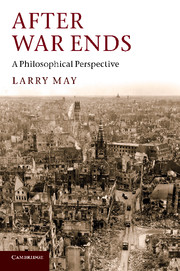Chapter 12 - Proportionality and the fog of war
Published online by Cambridge University Press: 05 June 2012
Summary
In this chapter I will reflect on the role that the jus post bellum principles play in the Just War tradition in general, paying special attention to the principle of proportionality. And I will also consider how we should think about the concept of war in general after our jus post bellum reflections. I shall consider the end of war, now understood as the end to all war, not merely the end to a particular war, as the United Nations Charter seemingly promised, when it was announced in the Preamble that the People of the United Nations were “determined to save succeeding generations from the scourge of war.” If people who were contemplating going to war had to think seriously about post war issues, would they be less likely to initiate war in the first place? And how should we view the so-called “fog of war?”
The chapter will proceed as follows. In the first section I will set out the problem of indeterminacy in proportionality assessments. In the second section I examine some of Michael Walzer’s views about retribution and reconciliation. In the third section I will try to formulate and defend a post war principle of proportionality, discussing how it relates to other proportionality principles, as well as to other jus post bellum principles. In the fourth section I examine the fog of war, especially concerning Robert McNamara’s calculations about the application of the principle of proportionality to the firebombing of Tokyo. In the fifth section I outline a general account of contingent pacifism that seems to me to follow from careful consideration of the jus post bellum principle of proportionality. In the sixth section I begin a discussion about the prospects for the end of war in light of considerations about the justice of how particular wars should end. And in the final section I provide a summary of some of the main conclusions I have reached throughout the book.
- Type
- Chapter
- Information
- After War EndsA Philosophical Perspective, pp. 219 - 238Publisher: Cambridge University PressPrint publication year: 2012

